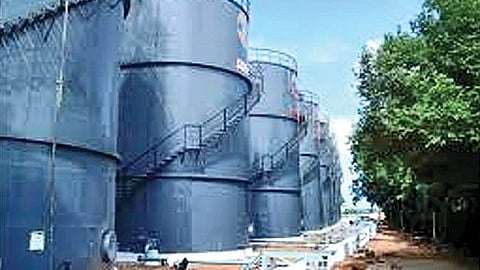

COLOMBO: In the 2003 tripartite agreement between the Lanka Indian Oil Corporation (LIOC), the Sri Lankan government’s Treasury, and the Ceylon Petroleum Corporation (CPC), there was no requirement to sign a “Lease Agreement” on the transfer of the 99 oil tanks in the eastern town of Trincomalee to the LIOC, Express learns from informed sources.
The Sri Lankan parliamentary Committee on Public Enterprises (COPE) threw a bombshell recently by recommending that the government take over the Trincomalee oil tanks from the LIOC because no Lease Agreement was signed since they were handed over to the LIOC in 2003.
COPE chairman Sunil Handunnetti was quoted as saying that a Lease Agreement was to have been signed within six months of the transfer of the tanks but it was not.
The LIOC is a wholly owned subsidiary of the Indian oil major Indian Oil Corporation (IOC).
Express learns that the 2003 tripartite agreement envisaged the transfer of the land and the tanks to LIOC for 35 years, and an annual payment of US$ 99,000 to the Sri Lankan Treasury and US$ 1000 to the CPC by the LIOC. The local land record relating to the tank farm was changed to make the LIOC the occupier instead of the CPC.
Since the handing over, the LIOC has been making the stipulated annual payment of US$ 100,000 without fail.
Sources also pointed out that there is no termination clause in the 2003 agreement. Presumably, all three parties will have agree to the termination of the arrangement.
The 99 tanks, with 15 in the Lower Tank Farm and 84 in the Upper Tank Farm, were handed over to the LIOC partly because India wanted them for strategic reasons and Sri Lanka did not have the resources to use them or develop them for use.
Following the transfer, India refurbished 15 tanks in the Lower Tank Farm and built two more, at a cost of over US$ 15 million. It has been having plans to invest another US$ 17 million to refurbish some tanks in the Upper Tank Farm also.
While the LIOC has been the main user of the tanks, the Sri Lanka Air Force and PRIMA bread factory have been using four.
Plans were made to refurbish the 84 tanks in the Upper Tank Farm, but the government of India has been dragging its feet on this suggestion given the cost involved. The tanks are not easy to refurbish as each one of them is protected by a thick concrete wall to protect them from air raids.
However, local LIOC officials had told the powers-that-be in New Delhi of the strategic need to use the 84 tanks for storage of petroleum products as the available capacity is humongous one million tones, with each tank having a capacity to store 12,100 tonnes. The need to have a strategic foothold was felt also because in 2010-2013, Pakistani naval personnel were involved in exercises in the Trincomalee harbor and China Bay.
China Bay, where the harbor is located, is of great strategic value to India as it is extremely well protected from natural disasters. The tsunami, which devastated the Sri Lankan eastern coast north and south of China Bay in December 2014, did not touch the oil tank farm or the LIOC’s terminal in China Bay.
In 2013, the Mahinda Rajapaksa government unofficially said that it might ask the LIOC to quit because the original agreement was not entered into in a proper manner and that the land on which the tanks stood had not been handed over to LIOC legally. It was also stated that the CPC had no authority to give permission to the LIOC to use the tanks because the CPC did not own the tank farm, which was government’s property. It was also said that LIOC was paying only a nominal fee for the use of the tanks.
Reacting to this the government of India unofficially warned Sri Lanka that the deal on the Trincomalee oil tank farm was the result of the India-Sri Lanka Accord of 1987 and was a government to government agreement which could not be unilaterally abrogated. The Rajapaksa government thereafter stopped talking of a takeover.
But with the change of government in Sri Lanka in January 2015, Prime Minister Ranil Wickremesinghe proposed an India-Sri Lanka joint venture to develop 30 tanks in the Upper Tank Farm through a new joint venture involving LIOC and the CPC.
The Minister of Petroleum, Chandima Weerakkody, told Parliament in October 2016, that nine tanks in the Upper Tank Farm could be used immediately after minor repairs. The government wants to increase its total storage capacity to 90,000 MT, enabling it to benefit from the global oil price fluctuations, Weerakkody said.
Following this, a team from the CPC went to the Upper Tank Farm to inspect three tanks. But when the LIOC staff discovered the presence of an unauthorized person in the CPC team, they detained him for checking. This led to a furor in the media, though the LIOC stated that the questioning was legitimate.
However, striking an accommodative note, the LIOC also said that if the CPC wants three tanks to be refurbished for its use, the LIOC is willing to do it for the CPC.